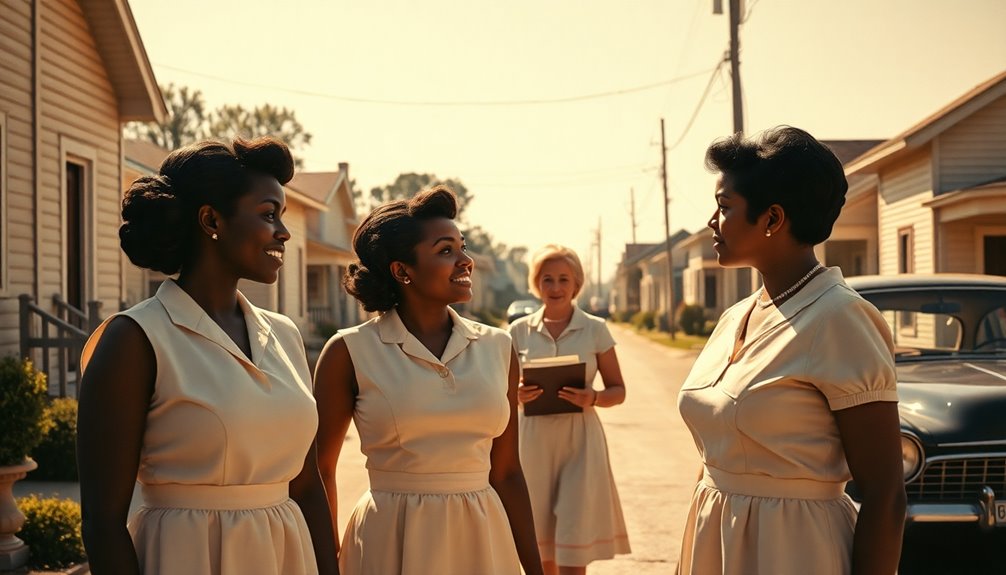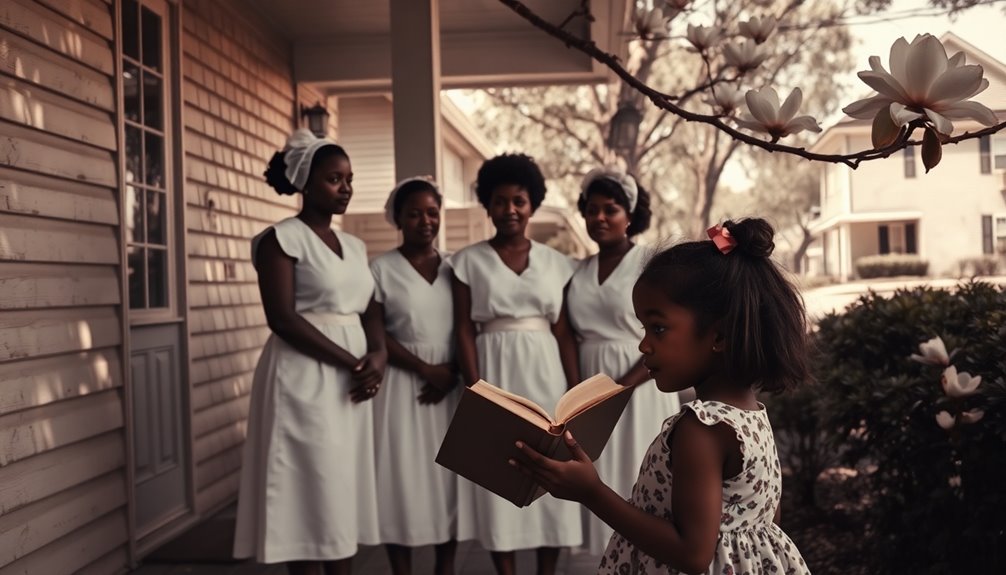In "The Help," Kathryn Stockett offers you a gripping look into 1960s Mississippi, highlighting the harsh realities of racism faced by African American maids. Through characters like Aibileen and Minny, you see their strength and resilience amid oppressive societal norms. Skeeter Phelan's courageous pursuit of justice invites you to reflect on privilege and allyship. Stockett critiques the status quo while illustrating the deep bonds formed across racial divides. There's much more to uncover about these complex narratives.
The Historical Context of 1960s Mississippi

In the turbulent 1960s, as the Civil Rights Movement gained momentum, Mississippi stood as a stark example of the deep-rooted racism and segregation that defined the era.
The Jim Crow laws enforced racial prejudice, ensuring African Americans faced discrimination in education, employment, and public services. Events like the March on Washington in 1963 and Freedom Summer in 1964 highlighted the struggle for civil rights, but Mississippi remained notorious for its violent backlash. The oppression faced by African Americans during this time mirrored the challenges encountered in Nazi Germany, emphasizing the universal struggle against tyranny. Additionally, systemic racism and historical legacies of oppression, as articulated in Understanding Between the World and Me, shaped the lived experiences of Black individuals in America.
The murder of civil rights leader Medgar Evers in 1963 exemplified the danger activists faced. Additionally, organizations like the Citizens' Council sought to uphold white supremacy, further entrenching systemic racism. The collective action of civil rights activists during this time mirrored the bravery of resistance movements in history, illustrating the ongoing fight against oppression.
Understanding this context is essential to grasping the challenges faced by African Americans during this pivotal decade.
The Impact of Racism on Daily Life
While steering through daily life in 1960s Mississippi, African Americans faced relentless racism that permeated every aspect of their existence.
For African American maids like Aibileen and Minny, daily tasks became fraught with dehumanization, as their worth often hinged on their utility rather than their humanity. Maneuvering through white households, they confronted neglect and discrimination, struggling to instill values of equality in the children they cared for. This experience echoes the broader historical injustices in medical research, particularly against African Americans, highlighting the pervasive nature of discrimination in various societal sectors. The contributions of humanitarian pioneers during this tumultuous period served as a reminder of the need for compassion and justice in society.
The societal norms dictated by white supremacy influenced not only their self-perception but also community dynamics, fostering a sense of inferiority.
Yet, the resilience of these maids served as silent acts of rebellion, showcasing their strength amid a culture of oppression and reflecting a broader struggle for recognition and dignity. This period of change was marked by significant racial tensions during the civil rights movement, as they navigated an environment rife with injustice and inequality.
Character Analysis: Aibileen Clark

Resilience defines Aibileen Clark's character, showcasing her strength and wisdom amid the harsh realities of 1960s Mississippi.
As an African American maid, Aibileen has cared for 17 white children, and her current focus is on the neglected Mae Mobley. Deeply affected by the loss of her own son, she nurtures Mae with love and teaches her crucial lessons about equality and self-worth. Personal growth is essential for Aibileen as she demonstrates her commitment to shaping Mae's understanding of self-worth. Aibileen's experiences reflect the systemic oppression faced by marginalized individuals, echoing the struggles seen in Richard Wright's "Native Son."
Daily, Aibileen faces racism, particularly from Miss Hilly, yet she remains steadfast. Her poignant mantra, "You is kind. You is smart. You is important," highlights her wisdom.
Ultimately, Aibileen joins Skeeter's book project, recognizing the importance of sharing the stories of black women like herself, aiming to challenge societal norms and inspire change through "The Help." The importance of education in overcoming challenges is a theme echoed in both Aibileen's journey and the experiences of characters like Francie Nolan from "A Tree Grows in Brooklyn."
Character Analysis: Minny Jackson
Minny Jackson's culinary skills not only showcase her talent but also serve as a form of empowerment, allowing her to navigate a world filled with challenges. Despite her exceptional abilities, she faces constant employment struggles due to her fiery personality and willingness to speak out against injustice. Her humor and sarcasm provide a revitalizing contrast to the harsh realities of her life, making her a compelling character in the story. Additionally, her journey parallels themes of betrayal and empowerment found in historical narratives like "The Lost Apothecary." Minny's resilience is akin to the transformative power of storytelling, illustrating how personal experiences can inspire and uplift others. Her story is a testament to the strength of women facing adversities, reflecting the courage required to overcome life's obstacles.
Minny's Culinary Skills
Culinary genius defines Minny Jackson, whose exceptional cooking skills are both her pride and her survival tool in the racially charged landscape of 1960s Mississippi.
As a black woman, Minny navigates her challenging environment with resilience, using her talent to foster relationships and assert her identity.
- Creating Bonds: Minny forms a unique connection with Miss Celia Foote through her cooking, earning respect and friendship.
- Coping Mechanism: Her fiery personality often leads to conflicts, but her culinary skills provide a way to stay afloat.
- Comic Relief: Minny's humorous remarks and sarcasm add levity, contrasting the serious themes of her world.
Through her cooking, Minny demonstrates the strength and resourcefulness of African American maids in a turbulent society.
Employment Struggles
While traversing the racially charged landscape of 1960s Mississippi, employment struggles plague Minny Jackson, a talented maid whose outspoken nature often puts her at odds with her employers.
Despite her exceptional cooking skills, Minny faces constant challenges in securing stable work due to her bold opinions, ultimately leading to her firing by Miss Hilly Holbrook.
Fortunately, she finds refuge with Miss Celia Foote, a socially ostracized woman, creating a unique bond between the two.
This dynamic showcases the intersection of white and African American experiences during a tumultuous era.
Through her trials, Minny's resilience shines, reflecting the broader theme of dignity and respect that African American women fought for amidst a discriminatory society, alongside her friend Aibileen.
Humor and Sarcasm
A fiery personality and sharp wit define Minny Jackson, making her one of the most memorable characters in "The Help." Her humor, often laced with sarcasm, serves as a coping mechanism against the harsh realities of life in 1960s Mississippi.
Minny's ability to use humor showcases her resilience and challenges societal expectations.
Here are three key aspects of her character:
- Coping Mechanism: Minny's sarcasm helps her navigate the oppressive environment around her.
- Comic Relief: Her witty remarks lighten the novel's heavier themes, making them more accessible.
- Social Commentary: Through her humor, Minny critiques the absurdities of societal expectations for both black and white women, revealing deeper truths about their lives.
Character Analysis: Eugenia Skeeter Phelan
Courage defines Eugenia Skeeter Phelan as she navigates the oppressive social landscape of 1960s Mississippi.
As a white woman, Skeeter challenges societal norms, driven by her respect for African American maids and a desire to share their stories. Her book project, which interviews Aibileen and Minny about their experiences with racial injustices, showcases her evolving understanding of race and equality. This exploration of social injustice highlights the systemic discrimination that marginalized communities face. In a time marked by escalating global conflicts, her commitment to amplifying these voices reflects a broader struggle for justice worldwide.
Despite pressure to conform to traditional female roles, Skeeter remains steadfast in her mission. This journey reveals her privilege and positions her as a white ally, sparking discussions about the complexities of her role as a "white savior."
Ultimately, Skeeter's character illustrates the struggle for justice amidst the constraints of her upbringing. Her efforts echo the importance of untold stories, emphasizing how sharing marginalized voices can enrich our understanding of societal progress.
Themes of Empathy and Resilience

In "The Help," you see how empathy shapes everyday interactions, especially through Aibileen's nurturing guidance of Mae Mobley.
Minny's resilience in the face of adversity highlights her strength and determination to assert her identity despite societal pressures.
Together, these themes reveal the power of kindness and the human spirit's ability to endure and connect across deep divides.
Empathy in Everyday Life
Empathy shapes our daily interactions, reminding us of the profound connections that can exist between individuals despite societal barriers. In "The Help," Aibileen embodies this sentiment as she nurtures Mae Mobley, teaching her about love and equality. This connection reflects the necessity of embracing our shared humanity.
Here are three key aspects of empathy in everyday life:
- Affirmation: Aibileen's mantra, "You is kind. You is smart. You is important," serves as a daily reminder of the power of kind words.
- Solidarity: The evolving friendship between Minny and Celia shows how women can unite across racial divides.
- Understanding: By sharing stories, we amplify marginalized voices, fostering deeper understanding and challenging biases.
Resilience Against Adversity
While traversing the harsh realities of 1960s Mississippi, the characters in "The Help" reveal how resilience can flourish even in the face of overwhelming adversity.
Aibileen and Minny exemplify this strength, steering through oppression while maintaining their dignity. Aibileen's nurturing spirit instills empathy in Mae Mobley, showcasing kindness amidst systemic racism.
Minny's defiant wit highlights the power of marginalized women to assert their identities and resist societal expectations. The narrative underscores storytelling as a tool for empowerment, allowing characters to reclaim their voices.
Through their relationships, you see the importance of solidarity across racial divides, fostering a deep sense of empathy. Together, these elements illustrate how resilience can thrive, even when faced with the most intimidating challenges.
The Role of African American Maids in Society
Despite the oppressive societal norms of the 1960s, African American maids played a critical role in the fabric of white households in Mississippi. They navigated systemic racism while forming emotional bonds with the children they cared for, like Aibileen Clark, who raised 17 white children.
Their contributions often went unnoticed, yet they were essential in shaping the lives of those around them.
Here are three key aspects of their role:
- Caretakers: They managed not only household chores but also nurtured white children.
- Cooks: Maids like Minny Jackson showcased exceptional culinary skills, highlighting their talents.
- Cultural Educators: They subtly taught lessons of love and equality to the children, challenging societal norms.
Criticism and Reception of The Help
Upon its release, The Help sparked a whirlwind of discussion, as readers found themselves torn between its compelling narrative and the concerns it raised about representation.
While many praised its engaging storytelling, significant criticism emerged regarding the white savior complex embedded in the plot. Some African American readers felt the portrayal of black maids was simplistic, reinforcing stereotypes and offering a sanitized view of the civil rights movement.
The novel's historical inaccuracies also provoked backlash, leading to debates about the responsibilities of authors in representing marginalized voices.
Despite the audiobook's enhanced character portrayal, it still faced scrutiny for validating the era's bigotry through dialogue.
The Legacy of The Help in Contemporary Discourse
As discussions around race and representation in literature evolve, The Help remains a focal point for examining the complexities of allyship and narrative ownership. This novel's legacy prompts critical reflection on the white savior narrative and its implications for representation.
You'll find that it raises important questions about empathy and the need for diverse voices in storytelling. Consider these points:
- The ongoing critique of Skeeter's role highlights the dangers of a single, dominant perspective in narratives about marginalized communities.
- The backlash against the book underscores the demand for authentic representation of Black experiences.
- Contemporary discourse continues to challenge the norms of storytelling, emphasizing the importance of amplifying diverse voices to foster genuine understanding and social justice.
Conclusion
To sum up, "The Help" offers a poignant glimpse into the lives of African American maids in 1960s Mississippi, highlighting their struggles and resilience. Did you know that during this era, over 90% of black domestic workers were employed in white households? This statistic underscores the power dynamics at play and the importance of the stories told within the novel. As you reflect on its themes, remember how empathy can bridge divides and foster understanding in today's world.



